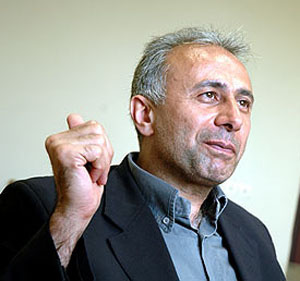Interaction Pattern of Iran and West in Tenth Administration

Mr. Ahmadinejad was endorsed by the Supreme Leader in the tanfiz ceremony on Monday. With tenth administration soon starting its term, what is your prediction of Iran-U.S. interaction?
The attendance of some European ambassadors is a sign of their de facto acknowledgment of Iran’s current political situation. In general, Americans and Europeans follow a pragmatic approach. Pragmatists always look after the one who holds the real power. They believe that cooperation should be carried out with those who have the largest control on power and political structures in a country. Hence, the process of Iran-U.S. interaction and the mechanism which has been formed during the recent months will continue to exist.
Of course, process may have become slower and the level of interaction may be less than what was predicted; however, those pragmatists who tend to resolve their regional crises amid this turbulent situation are compelled to follow step-by-step cooperation. When a de facto recognition of a situation is made interactions will naturally concern tactical goals. In line with these goals, Americans will initiate their interactions with Iran from less sensitive zones.
Iran’s deadline [to start nuclear talks with West] will end in September. How will the deadline influence approaches towards Iran-West interaction?
In September, the IAEA Board of Governor meeting will be held. United States and Europe focus on September since they regard it as the turning point for deciding about Iran’s nuclear program. While the Board of Governors insists that Iran yields to 1696, 1737, 1747 and 1803 resolutions, Iran’s behavior in foreign relations whether in past or present shows that it will never resign to halting nuclear activities.
Western countries will never achieve their security goals if their try to subjugate and threaten Iran. The reason is massive popular support for major national security concerns inside the country. There may have been long, serious strife over domestic issues, but political elite and society’s rationale is in favor of resistance against West pressures when it comes to Iran’s national security and international role.
What happens if Iran abstains to respond within the 2-month span? Should we wait for more serious measures by West?
Today, two major issues have been tied to each other. But they may not be so in future. One is the domestic politics which relates to social institutions, political figures and elite and the collective spirit of the Iranian society. The collective conscience has to decide in this area. But when it comes to the other one, foreign diplomacy, it is the ’state’ which is the representative of the nation in defending national interests. Hence, West –and especially Europe- can not follow a condescending pattern of conduct in treating Iran. The Iranian elite and citizens reject that.
So far, United States and Europe’s Iran policy was based on indirect control model. They held Five plus One meetings and dispatched EU Commissioner for External Relations Javier Solana to Iran for negotiations. But today, Iran should even reject the previous model. It is Europe and the United States who must show more flexibility. No Iranian government yields to aggressive behavior of foreign countries. That is not true for only a certain administration in Iran. It is what the Iranian society wants. Western states can start with an aggressive move on Iran, but they will have to withdraw later.
Hillary Clinton has talked of a defense umbrella for United States’ Persian Gulf allies. Is this a prelude to tough reactions against Iran’s silence on nuclear talks?
The Middle East defense umbrella is an extension of the European defense shield. This is the model Americans implemented during the 1980s. Their technological and economic conditions stop them from putting up the umbrella until 2015. However, as soon as the prerequisites are met, they will launch the project. Arab states’ concordance with U.S. security policies saves time for planning.
From the viewpoint of many Arab countries, particularly Saudi Arabia, Egypt, Jordan and UAE, Iran is now the superior power in the region, so they should balance their position against Iran. But the current circumstances are not ones which enable the United States to set up a regional defense. No such plan will be on U.S. agenda at least up to 2012.
How is Israel going to react with the expiration of the deadline? Will U.S. get closer to Israel after September?
Obama administration is not showing an approving face to Israel’s policies. They know that a major cause of current Middle East crises is lack of power balance in the region which derives from Israel’s unilateralism and quest for superiority. Israelis pursue their campaign to increase international pressures on Iran, but United States in Obama’s age will not cave in to their pressures. More importantly, they view the current Israeli government as a group of extremists who are against the peace process and two-state solution. Israel can not radicalize Iran-U.S. relations.
On the other hand, the Israelis have gained a significant success, which is forming a common ground with Arabs. That is, now they have formed an Arab-Israeli alliance which can be used against Iran’s Middle East policies.

